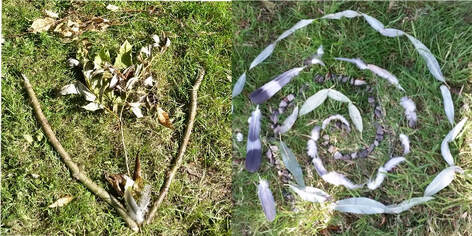|
The Forest School experience can have a real impact on how children play and learn together. Simple activities and shared experiences can bond groups and support better communication, sharing and support. The account below is from somebody I trained recently who has been developing their Forest School programme with different groups and looking at how this has supported their ability to learn and develop as a group.
I took a small group of four boys who all have Special Educations Needs/ Education Health & Care Plans for forest school sessions. They had done several forest school sessions which they really enjoyed. During one session while they were playing one of the boys got muddy whilst playing on the tyre swing. He then got mud on his face from his hands. The other boys decided to mark mud on their faces to. They then all called them their ‘forest school’ faces. They then walked back happily as a group with their ‘forest school faces’ we bumped into the caretaker on the way back up and it made him smile. I then had to get them all to wash their faces before they went back to the class but I could see that it had been a good shared experience and they all enjoyed being part of their little ‘forest school’ group. I could see that it had helped them cement their forest school group and bond together as a team. Bug hunting proved very popular one of the forest school groups. Once they had done a bit of bug hunting, I called everyone back round to the fire circle. Those children who had found bugs in small pairs/ groups then walked round to show everyone what they had found. This included ‘Colin the Centipede’ who was an impressively large centipede, this made a lot of the children smile and laugh. Several had found centipedes, there was one black ground beetle and lots of woodlice. The shared enjoyment of bug hunting as group helped to bring the group together. I have found that doing work in small groups or pairs and then bringing everyone together again to talk about what they’ve found and share ideas is a good way to develop a community of learning. After this we did bug hotel building, I was pleased to see that groups increased in size and bug houses connected in together for some groups. I could see some great team working between the groups and the sharing of different ideas. I also saw a knock-on positive effect from the bug hunting forest school. At lunchtime A and M were a bit upset as they hadn’t had much time playing on the tyre swing. Then A taught M about making a bug hotel (as she’d done it the previous day in forest school) and they both happily worked on this. M then had the idea of adding a bridge for the bugs and the structure grew from there. Then later that day M had a forest school session and she was very proud making another bug hotel area and shared her ideas with others in the group. She had a very large bug hotel with ‘one ladybird and one worm’ which she proudly showed to the adults. I have also noticed that routine and repetition have a calming effect on the group, and I think probably helps develop a community of learning and a feeling of being part of a team/ group. I have repeated the colour match game over several weeks and seen this evolve and children begin to work together more. Also, I have seen that coming together, to have a hot drink and cook some food, encourages a collective experience and encourages good social skills within the group as a whole.
0 Comments
Your comment will be posted after it is approved.
Leave a Reply. |
Details
AuthorJon Attwood has been leading outdoor activities in the wider Bristol area for over 20 years. He developed a passion for nature and a love of the outdoors as a child and was lucky to have a free range childhood with plenty of time exploring wild corners of rural Essex. Jon is a Forest School leader and trainer and is happiest in the woods sharing experiences with children and adults. Archives
February 2024
Categories
All
|

 RSS Feed
RSS Feed
